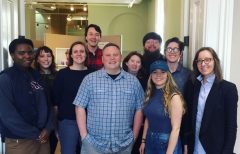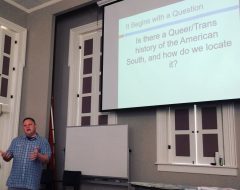Andrew Mellon Foundation Recognizes Invisible Histories Project
IHP-Mississippi satellite project lauded for oral history research
Written by Rebecca Lauck Cleary
The Andrew W. Mellon Foundation has recognized the work of several University of Mississippi partners through a $300,000 grant supporting the collection, preservation, future research and accessibility of LGBTQ history in Alabama, Mississippi and Georgia.
The grant went to the Invisible Histories Project, founded in 2016 by Joshua Burford and Maigen Sullivan and based in Birmingham, Alabama, with money also going to the satellite Invisible Histories Project-Mississippi.
Mississippi partners on the grant include the university’s Center for the Study of Southern Culture, Sarah Isom Center for Women and Gender Studies, and Department of Special Collections and Archives. The goal of the project is to expand and make publicly available manuscript and oral history collections that document LGBTQ histories of Mississippi.
“The project provides a unique opportunity to collaborate across campus departments and units, as well as across the Southeast, to bring together scholars devoted to interdisciplinary research,” said Jessica Wilkerson, UM associate professor of history and Southern studies. “I’m excited to work with my colleagues on a cutting-edge, necessary project to document queer and Southern history.”
Besides Wilkerson, faculty members primarily involved in the project are Amy McDowell, assistant professor of sociology, and Jaime Harker, Isom Center director and professor of English.
The seeds of IHP-Mississippi were planted last year when Burford visited the Center for the Study of Southern Culture and met with Wilkerson and her Queer Southern History class, which was developing an oral history project. During that visit, Southern studies faculty and staff, the Isom Center, and Special Collections and Archives began exploring the possibility of starting an IHP satellite project at Ole Miss.

The university is the only IHP satellite site, although plans are for the University of West Georgia to become a satellite in spring 2020, Burford said.
“We have received the most amazing support from UM for this project and your outstanding staff and faculty have really been leaders in the expansion of our work,” said Burford, IHP’s director of community engagement. “They saw in us the potential of what Invisible Histories Project could do and invested early.
“There is so much amazing queer history in Mississippi and with the help of your campus, we are going to be leaders in the field of preservation and research of LGBTQ history both in and out of the South.”

Along with receiving $10,000 to support the two-year project, IHP-Mississippi will be part of the bigger IHP model. The project’s staff will provide support through site visits, helping to locate research opportunities, advising on queer history courses and research development, connecting institutions to repositories and community organizations, providing branding and paperwork, developing a site plan of goals and outcomes, and providing trainings for students and faculty.
Beyond that, joining the IHP network is mportant because it allows participants to learn from archivists and public historians already doing this work, Wilkerson said.
Burford and Sullivan will visit Oxford this summer to meet with the project team and develop a site plan for the 2019-20 academic year.
The project will benefit students and hopefully help attract up-and-coming scholars of the queer South, Wilkerson said.
“Of course, Jaime Harker is leading the way as a faculty member with her book ‘The Lesbian South,'” Wilkerson said.”Mostly, I was inspired by the group of students in my spring Southern studies seminar.
“They laid the groundwork for this project by conducting oral history interviews with gay, lesbian and queer community members in Oxford, and they showed me that a larger project was possible.”
Additionally, Wilkerson’s fall 2019 Southern studies graduate seminar will expand the oral history project begun last spring on Mississippi LGBTQ history. Wilkerson and McDowell also received an Isom Fellowship to help support the expanding LGBTQ oral history and archiving project.
The Andrew W. Mellon Foundation endeavors to strengthen, promote and, where necessary, defend the contributions of the humanities and the arts to human flourishing and to the well-being of diverse and democratic societies. To this end, it supports institutions of higher education and culture as they renew and provide access to an invaluable heritage of ambitious, path-breaking work.
The foundation makes grants in four core program areas: Higher Education and Scholarship in the Humanities, Arts and Cultural Heritage, Scholarly Communications, and International Higher Education and Strategic Projects.
More information on the Invisible Histories Project can be found at https://www.invisiblehistory.org/.
